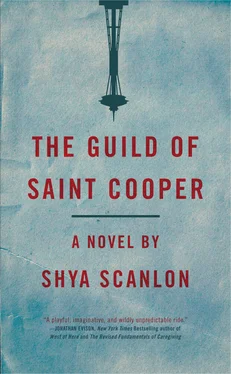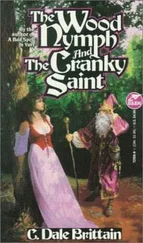My mother stopped and shook her head. “Oh, Christ,” she said. “You’re talking about diggers.”
“It’s pretty gruesome. I’d like to get a green light to inter-vene.”
We walked on.
“Mom,” I said.
I could see now where the ground gave way to a large hole, maybe twenty feet across. At first it appeared to be empty, but it was deeper than I expected, and as we got closer I began to see small brown bursts of dirt flying out of it, and to hear a soft scratching sound. My mother walked forward with the man but I held back, suddenly afraid to look down into the pit. Around me dirt was strewn over the ground in mounds of various sizes, with larger piles on the far side. The hole wasn’t round, I noticed, but square, with walls nearly perpendicular to the surface. It was as though a foundation were being dug.
A suited man appeared from the way we’d come and met with my mother as she stood at the hole’s edge, looking down. He wasn’t wearing any protective gear, but he was animated, loose, and waved to the three City men still huddled by the shore. My mother gestured down into the hole and began speaking to him in a hushed voice. He held up his hands as if in protest, as if to say it was out of his control. She pointed down again, sternly; I could see that her body had grown stiff with authority. She poked her finger one last time and the man looked down. The smile drained from his face, and he pressed his lips together in certitude or resignation, or both. Beyond them a pair of gulls hovered above the water, borne on a breeze I couldn’t feel. I was shocked by how quickly I’d gotten out of my depth. How had I thought I could simply immerse myself once more in the goings-on of the Lights, of the city, of Weyerhaeuser? The fact was, I’d never really had to do my own research. My articles had always been no more than acts of translation — I’d created narrative tension around facts and details fed to me by others to be broadcast by others. I’d been nothing more than a conduit. My mother began walking toward me but veered with the path back to the parking lot.
“Clay should be able to put you in touch with Blake,” she said. “I’ll be in the car.”
I watched her walk away, half wanting to follow, and the unsuited man came to stand at my side.
“Your mother is a shrewd woman. She should have gone into business.”
What was that supposed to mean?
“She’s a public servant at heart,” I said.
“Clay Baynes,” he said, taking a step forward and holding out a hand. “I believe you’re looking for the woman I work for.”
Clay was twitching slightly, something that could have been a kind of low-level Tourette’s or just too much caffeine.
“Yes,” I said. “I want to talk to Blake.”
He smiled, stiff-lipped.
“I could pass along a message,” he said.
“I need to see her personally.”
“She’s a busy woman. Why don’t you just let me pass something along. It’s a big favor as is, trust me.”
“I’m an old friend,” I said. “If you just—”
“I know who you are, Blake. And like I said.”
“Look, I could just go down to Weyerhaeuser and—”
“You wouldn’t get anywhere near her.”
The three City men started laughing, and though I knew it couldn’t be at my expense, the timing made Clay bolder.
“Do you want to write it down? I’ve got some paper in the car.” His smile was a smirk.
I pulled the Guild letter from my pocket and unfolded it before him, holding it up.
“I’ve got all the paper I need right here,” I said. “And I think Blake might want to hear me out.”
His smile vanished. He held up a finger and fished for his phone. Since the cell towers had fallen into disrepair, satellite phones were all that was left and they looked silly, big and bulky, like antiques. Clay finally got his free from his pocket only after he’d turned its contents inside out. A pen, two business cards, and a few white pills fell to the ground as he walked back to the hole for privacy.
It occurred to me that I might have not only ruined the likelihood of seeing Blake, I might be in serious trouble. Weyerhaeuser was above the law, and if they thought I was a threat, that I was somehow involved or had information about an organization responsible for the destruction of the Lights’ food source, there was absolutely nothing I’d be able to do to escape mistreatment. There was only one way I could think of to unfuck myself: tell Clay where I got the letter. Claim that this had been my intention. Zane didn’t mean that much to me, after all. Aside from his delivering my drugs, we weren’t close. That left a purely ethical dimension to the issue I was fairly sure I could navigate — wouldn’t it be difficult for my mother if I were locked up? Wouldn’t it therefore be hard on all the people she helped? To keep her in the clear, it would make sense to sacrifice a drug dealer. I wondered whether they’d expect me to become part of a sting operation. I wouldn’t be able to track him, per se, but his schedule was regular so it wouldn’t be that difficult: we’d simply have to wait until the following week.
Clay finished his phone call and, after another look down into the hole, walked back my way. My muscles tightened. My mother would disapprove of the entire thing.
Clay shook his head. “Well,” he said, “congratulations, I guess.”
“Listen,” I said.
“A car will come around tomorrow evening at six and pick you up.”
“A car?”
He bent down to gather what had fallen out of his pocket, and a burst of dirt flew out of the hole behind him.
“What about them?” I said. “Aren’t they going to be pulled out of there?”
“Not a good idea to mess with people in service. You can mix up their brains and they’ll never regain consciousness.”
“But that other guy said—”
“That other guy doesn’t call the shots. Your mom does. And she struck a deal.” Clay stood up. “I’d put that away if I were you,” he said of the letter, still unfolded, in my hand. “You don’t want them to see it.” He nodded over my shoulder, and I turned to see a dozen Lights moving toward us from up the path, deeper in the park.
I quickly tucked away the paper and scanned for other Lights.
“Six o’clock,” Clay repeated, and he started heading back. I waved to my mother, though she didn’t appear to be looking in my direction, then noticed that Clay had overlooked one of the business cards. I picked it up and on impulse jogged to the edge of the hole.
My mother once told me that the most difficult part of her job was catering to people who hurt themselves while serving because they didn’t actually want to stop. It was like caring for addicts, she’d said. Whatever access the Lights had to the nervous system, it either didn’t include pain receptivity or else they chose to ignore it. Either way, people had no sense that their bodies were damaged. Even in the throes of death, she’d said, they were clawing toward some ineffable goal.
The square hole was roughly ten feet deep, and the men and women in it were in various states of debilitation. Some of them seemed to struggle against their own physical exhaustion, their arms reaching forward slowly toward the dirt, which they merely brushed before the weight of their own hands was too much. Others, strangely haywire, writhed in place. But at least three of the souls were still hard at work, digging down and out with hands coated in wet black soil. Their hands were strange somehow, their fingers blunt, and with the thick, ubiquitous mud it took a few moments before I understood what had been making the others squirm.
Averting my eyes, I flipped over Clay’s small card. The name on it was Mitch Earl, Private Investigator.
Читать дальше












